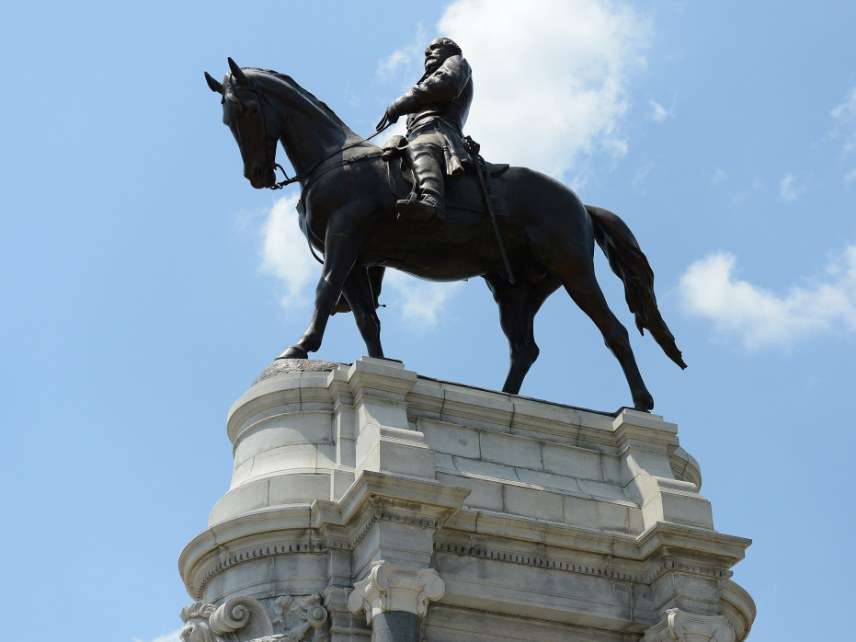Virginia Governor Responds to Violence with Temporary Protest Ban in Richmond
No more public gathering around a handful of Confederate monuments until the government can make more rules.

Eyewitness reports on the ground at the Charlottesville, Virginia, protest indicate that the police did not do a very good job of keeping the sides physically separated. There's no good excuse for why this happened; we know full well at this point that people with violent or otherwise disruptive plans are embedding themselves inside large political protests like these.
But Virginia Gov. Terry McAuliffe seems bent on the idea that there's some bigger, grander explanation, and so now he's temporarily banning any and all protests at the statue of General Robert E. Lee in Richmond, Virginia.
All of it! Until the government can best figure out how to regulate you people and all those messy ideas you insist on expressing. McAuliffe makes it very clear in his statement and the executive action he signed on Friday that the problem is you:
Reviewing the events in Charlottesville to determine what steps can and should be taken to prevent any such violence from occurring again is critically necessary for public safety and demands a full review of permitting processes and other relevant regulations. There are already, and it is anticipated that there will be more, permit requests for demonstrations at the Lee Monument as the public debate over Confederate monuments continues, leaving grave risks for future civil unrest. Until a full review process has been concluded, it is a threat to public safety to allow permit-requiring activity to occur in the absence of such sensible regulations that should be implemented to govern all expressive activity at the Lee Monument, no matter its content.
"No matter its content." The executive order forbids any protests at the Lee monument and any permits for protests to express any positions or views whatsoever, "engaged in by one or more persons." No flags, no signs, no banners. He does not care whether there are counterprotesters or the possibility of confrontations. You are not allowed to express opinions loudly around the Lee monument, and you can face trespassing charges if you defy him.
McAuliffe is calling for a "task force" that will have three entire months to come up with the appropriate "regulations" to manage protests at this monument.
Coincidentally, during this period of deep government reflection on what it might take to keep people from hitting each other at protests, Richmond is deciding whether to remove its Confederate statues. The mayor of the city announced last week that he would like to see them gone. The city may make a decision on whether to do so in September. You'd have to be extremely naïve not to realize that McAuliffe's order prevents protesting at the site of controversy until after the decision has been made.
We should be terribly concerned whenever governments censor and suppress public debate because of the inconveniences it presents to law and order.
We already see this on public college campuses. Any whiff of violence is used to cancel speakers, which incentivizes people to see the possibility of violence when speakers they don't like come to town. As we also have seen, college campuses will use the cost or inconvenience of having to protect speakers as an excuse to shut down an event.
Don't be surprised if additional officials attempt to replicate what McAuliffe is trying to do here: use the excuse of public safety to shut down protests. We recently saw Sen. Dianne Feinstein (D-Calif.) say outright that it's too expensive and unreasonable for college police forces to protect protesters from violence.
A core role of the police in the United States is to protect citizens' rights to assemble freely and protest safely. If the police have to spend a day keeping two sides apart, that's not some "distraction" from their jobs. It is one of the reasons we have police at all. Protecting life, liberty, and property is not just about fighting crime and catching crooks. It's also about making sure citizens are safely able to express their civil liberties without somebody throwing bricks at their head or beating them with a stick.
McAuliffe's order is so broad, it would authorize the cops to remove a harmless street preacher if some passers-by started arguing with him. This goes far beyond preventing harm into shutting down merely inconvenient behavior, using the government's own failure to properly protect people as an excuse.


Show Comments (139)